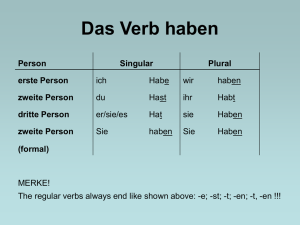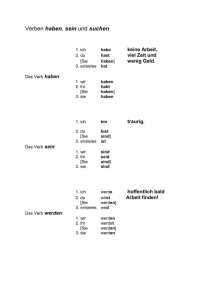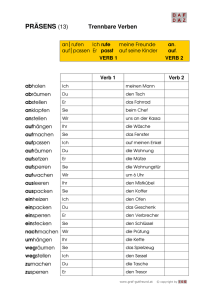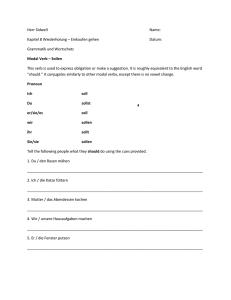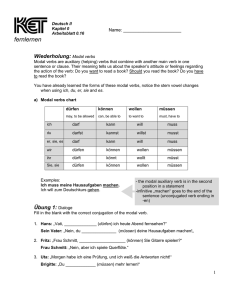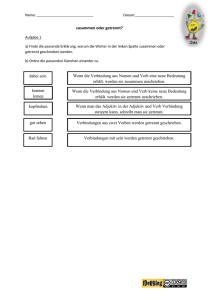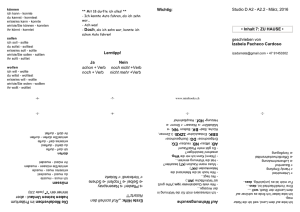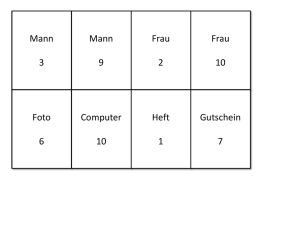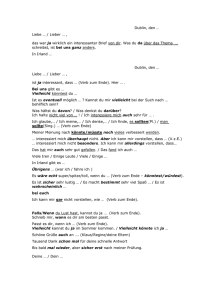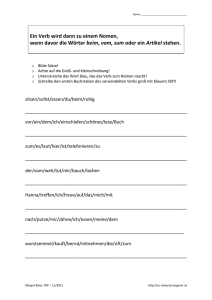Muster 1 - Hueber | Shop/Katalog
Werbung
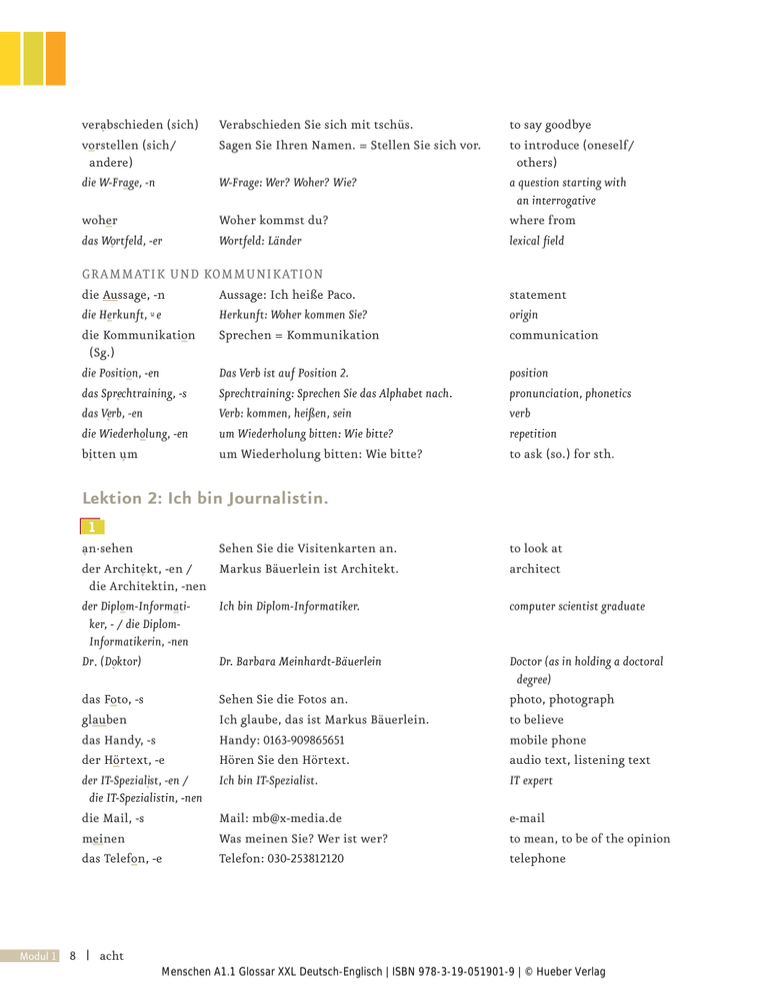
vera. bschieden (sich) vorstellen (sich / andere) die W-Frage, -n W-Frage: Wer? Woher? Wie? woher das Wo. rtfeld, -er Woher kommst du? Wortfeld: Länder Verabschieden Sie sich mit tschüs. Sagen Sie Ihren Namen. = Stellen Sie sich vor. to say goodbye to introduce (oneself/ others) a question starting with an interrogative where from lexical field GRAMMATIK UND KOMMUNIKATION die Aussage, -n die Herkunft, -̈ e die Kommunikation (Sg.) die Position, -en das Spre. chtraining, -s das Ve. rb, -en die Wiederholung, -en bi.tten u. m Aussage: Ich heiße Paco. Herkunft: Woher kommen Sie? Sprechen = Kommunikation statement origin communication Das Verb ist auf Position 2. Sprechtraining: Sprechen Sie das Alphabet nach. Verb: kommen, heißen, sein um Wiederholung bitten: Wie bitte? um Wiederholung bitten: Wie bitte? position pronunciation, phonetics verb repetition to ask (so.) for sth. Lektion 2: Ich bin Journalistin. 1 a. n·sehen der Archite. kt, -en / die Architektin, -nen der Diplom-Informatiker, - / die DiplomInformatikerin, -nen Dr· (Do. ktor) das Foto, -s glauben das Handy, -s der Hörtext, -e der IT-Speziali.st, -en / die IT-Spezialistin, -nen die Mail, -s meinen das Telefon, -e Modul 1 8 | Sehen Sie die Visitenkarten an. Markus Bäuerlein ist Architekt. to look at architect Ich bin Diplom-Informatiker. computer scientist graduate Dr. Barbara Meinhardt-Bäuerlein Sehen Sie die Fotos an. Ich glaube, das ist Markus Bäuerlein. Handy: 0163-909865651 Hören Sie den Hörtext. Ich bin IT-Spezialist. Doctor (as in holding a doctoral degree) photo, photograph to believe mobile phone audio text, listening text IT expert Mail: [email protected] Was meinen Sie? Wer ist wer? Telefon: 030-253812120 e-mail to mean, to be of the opinion telephone acht Menschen A1.1 Glossar XXL Deutsch-Englisch | ISBN 978-3-19-051901-9 | © Hueber Verlag Vocabulary BILDLEXIKON der Arzt, -̈ e / die Ärztin, -nen doctor (med.) der Lehrer, - / die Lehrerin, -nen teacher der Friseur, -e / die Friseurin, -nen hairdresser der Schauspieler, - / die Schauspielerin, -nen actor, actress der Ingenieur, -e / die Ingenieurin, -nen engineer der Sekretär, -e / die Sekretärin, -nen secretary der Verkäufer, - / die Verkäuferin, -nen shop assistant der Journali.st, -en / journalist die Journali.stin, -nen PROFESSIONS der Ke. llner, - / die Ke. llnerin, -nen waiter, waitress der Mechatroniker, - / die Ich arbeite als Mechatroniker. Mechatronikerin, -nen der Stude. nt, -en / Nadine ist Studentin. die Stude. ntin, -nen mechatronic technician student 2 a. ls die Ausbildung, -en bei beruflich fi.nden die Hi.lfe, -n der Historiker, - / die Historikerin, -nen .im der Jo. b, -s das Kä. rtchen, der Ku. rs, -e ma. chen das Plakat, -e das Pra. ktikum, Pra. ktika die Schule, -n Ich arbeite als Journalistin. Ich mache eine Ausbildung als Friseur. Ich arbeite bei X-Media. Was machen Sie beruflich? Hilfe finden Sie im Bildlexikon. Hilfe finden Sie im Wörterbuch. Ich bin Historikerin. here: as here: training here: at professional to find help historian Hilfe finden Sie im Wörterbuch. Ich habe einen Job als Kellnerin. Schreiben Sie Kärtchen. Suchen Sie im Kurs. Was machen Sie beruflich? Machen Sie ein Plakat. Ich mache ein Praktikum bei X-Media. here: at job note card course to do poster, bill internship Schule: Goethe-Gymnasium school neun Menschen A1.1 Glossar XXL Deutsch-Englisch | ISBN 978-3-19-051901-9 | © Hueber Verlag | 9 Modul 1 der Schüler, - / die Schülerin, -nen der Si.ngle, -s die Ste. lle, -n suchen die Universität, -en vo. n das Wö. rterbuch, -̈ er Ich bin Schüler. pupil Ich bin Single. Stelle: Journalistin bei X-Media Suchen Sie im Kurs. Universität: Sorbonne in Paris Was sind Sie von Beruf? Hilfe finden Sie im Wörterbuch. single (here: employment) position to search university by, of, from dictionary Wir sind nicht verheiratet, aber Peter und ich leben zusammen. Ich lebe allein. Haben Sie etwas gemeinsam? Was haben Sven und Nadine gemeinsam? Wir sind geschieden. Wo wohnt ihr? but 3 aber allein .etwas gemeinsam geschieden ihr das .Interview, -s jemand je. tzt kein / e das Ki.nd, -er okay das Paar, -e ri.chtig sie (Plural) Sven und Nadine wohnen in Berlin. Hören Sie das Interview. Hat jemand etwas mit Ihnen gemeinsam? Fragen Sie jetzt die anderen Paare. Sie haben keine Kinder. Wir haben ein Kind. Wir sind Kellner von Beruf, okay? Fragen Sie die anderen Paare im Kurs. Was ist richtig? Kreuzen Sie an. Sie leben zusammen. die Sta. dt, -̈ e überlegen wir In welcher Stadt wohnen Sie? Überlegen Sie mit Ihrem Partner. Wir sind geschieden. wohnen zusa. mmen·leben Sie wohnen in Berlin. Peter und ich leben zusammen. alone something common divorced you (personal pronoun, plural, nominative, familiar) in interview someone now no child okay couple, pair correct they (personal pronoun, plural, nominative) town, city to reflect, to think we (personal pronoun, plural, nominative) to live to cohabit, to share a home 2 – 4 – 6 – … 10? – Falsch. Welche Zahl fehlt? Machen Sie Rätsel. incorrect, wrong to miss, to be missing puzzle, riddle .in 4 fa. lsch fehlen das Rätsel, - Modul 1 10 | zehn Menschen A1.1 Glossar XXL Deutsch-Englisch | ISBN 978-3-19-051901-9 | © Hueber Verlag Vocabulary die Varia. nte, -n vo. n … bi.s die Zahlenreihe, -n Machen Sie Zahlenreihen. Variante: Machen Sie Rätsel. Zahlen von 0 bis 100 Machen Sie Zahlenreihen. variation from … until sequence of numbers Wie alt bist du? Alter: Ich bin 34. Barbara arbeitet bei X-Media. Das ist der Arbeitgeber. Spielen Sie „Echo“. Ich bin auch 34 Jahre alt. Spielen Sie „Echo“. Super! Ich bin auch 34. Wo wohnen Sven und Nadine? Wohnort: Berlin old age employer echo year to play super where place of residence Machen Sie ähnliche Aufgaben. Ist Helga Stiemer arbeitslos? Machen Sie zu zweit ähnliche Aufgaben. Sonja Wilkens ist Krankenschwester von Beruf. similar unemployed exercise nurse Kommen Sie aus Norwegen? Kommt Carlos aus Portugal? Helga Stiemer ist Rentnerin. Norway Portugal pensioner Bo Martinson kommt aus Schweden. Er studiert in Kiel. Ihre Partnerin liest Ihnen drei Texte vor. Sweden to study to read aloud, to read sth. to so. word to understand 5 a. lt das A. lter, der A. rbeitgeber, das .Echo, -s das Jahr, -e spielen super wo der Wohnort, -e 6 ähnlich a. rbeitslos die Aufgabe, -n die Kra. nkenschwester, -n / der Krankenpfleger, (das) No. rwegen (das) Po. rtugal der Re. ntner, - / die Re. ntnerin, -nen (das) Schweden studieren vor·lesen das Wo. rt, -̈ er verstehen zusa. mmen·arbeiten Verstehen Sie ein Wort nicht? Verstehen Sie ein Wort nicht? Hilfe finden Sie im Wörterbuch. Arbeiten Sie mit einem anderen Paar zusammen. to work together, to cooperate 7 (das) Dänemark markieren se. lbst Mette kommt aus Dänemark. Markieren Sie die Verben. Schreiben Sie einen Text über sich selbst. Denmark to mark, to highlight yourself, oneself elf Menschen A1.1 Glossar XXL Deutsch-Englisch | ISBN 978-3-19-051901-9 | © Hueber Verlag | 11 Modul 1 LERNZIELE der Beruf, -e der Familienstand (Sg.) haben das .Internet-Profil, -e ku. rz lesen die Negation, -en Persönliches der Plural (Sg.) si.ch der Ste. ckbrief, -e der Te. xt, -e über verheiratet die Visitenkarte, -n die Wo. rtbildung, -en die Zahl, -en über den Beruf sprechen: Ich bin Journalistin. Der Familienstand? Ich bin verheiratet. Ich habe einen Job als Kellnerin. Ergänzen Sie Ihr Internet-Profil. Schreiben Sie einen kurzen Text. Lesen Sie die Visitenkarten. Negation mit „nicht“: Ich bin nicht verheiratet. über Persönliches sprechen: Ich bin verheiratet. Singular: ich bin, Plural: wir sind Schreiben Sie einen Text über sich. Schreiben Sie einen Steckbrief. Schreiben Sie einen Text. Sprechen Sie über den Beruf. Ich bin verheiratet. Sehen Sie die Visitenkarten an. Wortbildung mit -in: Journalist, Journalistin Zahlen: 1, 2, 3 … profession marital status to have internet profile short to read negation personal plural oneself personal profile text here: about married business card word formation number GRAMMATIK UND KOMMUNIKATION de. r ● der Journalist, ● der Arzt leben (in) Ich lebe in Köln. die Präposition, -en Präpositionen: als, bei, in das Schreibtraining, -s Schreibtraining: Schreiben Sie einen Text über sich. TIPP Use small note cards for new words and example sentences. the (definite article, singular, masculine) to live (in) preposition writing exercise leben Wir leben in Malaga. Lektion 3: Das ist meine Mutter. 1 das Bi.ld, -er Die Frau auf dem Bild ist Herberts Frau. picture Mark studiert Physik. physics 2 die Physik (Sg.) Modul 1 12 | zwölf Menschen A1.1 Glossar XXL Deutsch-Englisch | ISBN 978-3-19-051901-9 | © Hueber Verlag Cultural Studies Language and culture are interrelated and learning a new language also means learning about the cultural context in which the language occurs. In this part, we will give you a general cultural introduction to life in German-speaking regions which will help you to improve your intercultural communicative skills. Introducing Oneself and Others In the course book, we have already looked at different ways of introducing oneself. It is important to know that Germans like handshaking. One or two kisses on the cheeks or hugs are, generally speaking, used for close friends and family only. The following expressions are common when introducing oneself: Ich bin John Brown. Ich heiße Mark Smith. Mein Name ist Tom Lee. I am John Brown. My name is Mark Smith. (Literally: I am called ...) My name is Tom Lee. In official situations (e.g. at the workplace), it is common to give the surname only: Brown, Smith … Depending on whether it is a formal or an informal situation, you will use different forms of asking for someone’s name. In a formal context, you can use either one of the following expressions which mean: ‘What is your name?’ Wie heißen Sie? Wie ist Ihr Name? Literally: What are you called? What is your name? In a less formal situation, people will use either one of the two following equivalent expressions which mean: ‘What is your name?’ Wie heißt du? Wer bist du? Literally: What are you called? Literally: Who are you? When introducing others, you can simply say: Das ist … That is … Then you add the name of the person. In circumstances where you would like to explain your relationship further you might say: Das ist mein Freund (my friend), meine Schwester (my sister) … There is no real equivalent for the English ‘Nice to meet you’ in the German language. In a formal context, one might reply with Sehr erfreut! or Freut mich! whereas in a less formal situation it is common practice to simply reply with Hallo or Guten Tag. dreiundzwanzig Menschen A1.1 Glossar XXL Deutsch-Englisch | ISBN 978-3-19-051901-9 | © Hueber Verlag | 23 Modul 1 Cultural Studies Greetings and Farewells In general, which greeting is being used depends on the time of the day. Until approximately 10 a.m., Guten Morgen is the most common greeting. Afterwards, Guten Tag is said up until around 5 or 6 p.m. However, in Austria and in Southern Germany Grüß Gott (‘May God greet you’) is widely used and in Switzerland you will hear the Swiss equivalent Grüezi which simply means ‘Greetings’. In the evening, after 5 or 6 p.m., the greeting Guten Abend is used and before going to bed people will say Gute Nacht. In a more informal context and especially among younger people, it is nowadays common practice to simply say Hallo. There are also numerous other informal and regional ways of greeting each other such as for example Hi (very common among young people) or Servus (popular informal greeting in Austria which can be used for either ‘Hello’ or ‘Goodbye’). Auf Wiedersehen is the standard expression for saying goodbye in a formal context, e.g. in a work environment. The equivalent Auf Wiederschauen is predominantly used in Austria and the South of Germany. On the phone, this common farewell is replaced by Auf Wiederhören, which literally means ‘Until we hear from each other again’. It is common practice to answer the phone with your surname in a private household (although recently the greeting Hallo has become more regular) and the company name, then surname when answering the phone in a company. In less formal situations, people will most commonly use Tschüss (also spelled Tschüs). The Italian greeting Ciao is becoming increasingly popular all over German-speaking areas and Austrians also like the expression Baba (soft pronunication sound). In English, the expression ‘See you later’ is a widely used expression of farewell. However, the German equivalent Bis später is only really used if you are actually intending on seeing someone again later on that same day. When to use du and Sie? In the German language, there are two different ways of expressing the English pronoun ‘you’ and it takes a bit of practice to figure out which one to use. Generally speaking, Sie (note the capital at the beginning) is used in formal contexts such as business relations and work environments, when talking to foreigners and in official or professional situations. The informal du is reserved for friends and family and is also common practice among young people. However, there are many situations when it is unclear whether to use du or Sie and an inappropriate use may be seen as disrespectful. Therefore, generally speaking, the rule is – if in doubt, one should always use the formal Sie. Modul 1 24 | vierundzwanzig Menschen A1.1 Glossar XXL Deutsch-Englisch | ISBN 978-3-19-051901-9 | © Hueber Verlag Grammar Explanations Lektion 7: Du kannst wirklich toll …! Modal auxiliaries and sentence brackets Modal auxiliaries are in German called Modalverben (modal verbs) and refer to the way we do things. For example: Do I have to do it? Am I able to? Should I do it? Do I want to? Modal verbs are usually used with the infinitive of another verb. In German, however, the infinitive is placed in the last position in the sentence! With the modal auxiliary in the usual second position and the infinitive of another verb in the last position, we form a structure that is typical and very common in German – the sentence bracket (Satzklammer). Du kannst wirklich toll kochen! You can cook really well! Sentence bracket In a question or request, the sentence bracket will begin from the first position. Kannst du das noch einmal sagen? Can you say it once again? Sentence bracket Modal auxiliary können The verb können is the German equivalent of the English modal auxiliary to be able to, can: Du kannst wirklich toll kochen! You can cook really well! Kannst du das noch einmal sagen? Can you say it once again? The conjugation of können is irregular. There is a vowel change in the stem ö → a in each person singular and the forms of the 1st and 3rd person are identical. singular plural Modul 3 54 | ich du er / sie wir ihr sie / Sie können kann kannst kann können könnt können vierundfünfzig Menschen A1.1 Glossar XXL Deutsch-Englisch | ISBN 978-3-19-051901-9 | © Hueber Verlag Grammar Explanations Irregular verbs with vowel changes Many irregular verbs have a vowel change in the stem in the 2nd and 3rd person singular. There are various changes possible, e.g. a → ä, e → i or e → ie fahren – to go, to drive, to ride Fährst du oft Ski? Do you ski often? lesen – to read Liest du oft? Do you read often? treffen – to meet Triffst du oft deine Freunde? ich du er / es / sie fahren fahre fährst fährt lesen lese liest liest Do you meet your friends often? treffen treffe triffst trifft Expressing astonishment and approval Modal particles are used to emphasize a particular aspect of the message, so it is difficult or impossible to translate them. Modal particles ja und aber can help us make compliments, express astonishment and approval: Du kannst ja toll singen! Du kannst aber toll singen! (Wow!) You can sing great! (Wow!) You can sing great! The same function can have the adverbial use of the word wirklich (really) Du kannst wirklich gut singen! You can sing really great! The adverb gern The German adverb gern can be used with almost any verb to express that we like doing something (or not). Liest du gern? Triffst du gern deine Freunde? Ich fahre nicht gern Ski? Do you like reading? Do you like meeting your friends? I don’t like skiing. Lektion 8: Kein Problem. Ich habe Zeit! The verb wissen Although the verb wissen (to know) is not a modal verb, the conjugation of wissen follows the same pattern as the modal verbs: the forms of the 1st and 3rd person singular are identical. fünfundfünfzig Menschen A1.1 Glossar XXL Deutsch-Englisch | ISBN 978-3-19-051901-9 | © Hueber Verlag | 55 Modul 3 Grammar Explanations German has two different verbs that can correspond to the single English verb to know. Knowing or being familiar with a person or thing (kennen) and knowing a fact → wissen. Was machst du heute? Das weiß ich noch nicht. singular plural ich du er / sie wir ihr sie / Sie What are you doing today? I don’t know yet. wissen weiß weißt weiß wissen wisst wissen Verb’s position in the sentence In a statement, the verb always comes second. No matter which element begins the statement. The subject will either come first or immediately after the verb. Ich habe heute Abend leider keine Zeit. Heute Abend habe ich leider keine Zeit. Leider habe ich heute Abend keine Zeit. Unfortunately I don’t have time tonight. Unfortunately I don’t have time tonight. Unfortunately I don’t have time tonight. Telling the Time If you want to know the time in German, the most common way of asking is Wie spät ist es? or Wie viel Uhr ist es?, which literally means ‘how many hours is it?’. The answer simply starts with: Es ist … In case it is not clear whether it is in the morning of afternoon, you can use the 24 hour system: Es ist fünfzehn Uhr. Es ist neunzehn Uhr. It is 3 p.m. It is 7 p.m. The tricky part about telling the time in German is how to say half past. In German, you say it is half an hour before the following hour whereas in English, you say it is half past the previous hour. It takes some time to getting used to but as always ‘practice makes perfect’ or as the Germans would say: Übung macht den Meister. Es ist halb fünf. Es ist halb elf. Modul 3 56 | It is half past four. It is half past ten. sechsundfünfzig Menschen A1.1 Glossar XXL Deutsch-Englisch | ISBN 978-3-19-051901-9 | © Hueber Verlag Grammar Explanations Temporal prepositions am and um Am and um can be used as temporal prepositions. Am is used with the days of the week (Monday, Tuesday etc.) and with the times of the day (morning, afternoon etc.) Only with “the night” we use in (in der Nacht / in the night) Am Montag treffe ich meine Freunde. Am Abend lese ich gern. On Monday I meet my friends. I like reading in the evening. Um is used with time (at 7 am, at 3 pm etc.) Das Konzert beginnt um 8 Uhr. Um drei Uhr gehe ich ins Museum. The concert begins at 8 pm. At 3 pm I am going to the museum. Preposition in and the form ins In can be used as a local preposition referring to direction or destination. In together with the article das in accusative creates the form ins. Ich gehe in eine Ausstellung. Karina geht ins Schmwimmbad. I am going to (see) an exhibition. Karina goes to the swimming pool. Lektion 9: Ich möchte was essen, Onkel Harry. Verbs mögen und möchten The modal verb mögen (to like) is used to express our general likes or dislikes for things (e.g. food). Tim likes chocolate. Do you like cheese? Tim mag Schokolade. Magst du Käse? The conjugation of mögen is irregular. There is a vowel change in the stem ö → a in every person singular and the forms of the 1st and 3rd person are identical. singular plural ich du er / sie wir ihr sie / Sie mögen mag magst mag mögen mögt mögen The modal verb möchten is a subjunctive form from mögen. Ich möchte… can be translated as I wish, I would like or I feel like (doing something). Möchte is usually used with the infinitive of another verb and forms a sentence bracket. siebenundfünfzig Menschen A1.1 Glossar XXL Deutsch-Englisch | ISBN 978-3-19-051901-9 | © Hueber Verlag | 57 Modul 3 Grammar Explanations Tim möchte heute Schokolade essen. Tim would like to eat chocolate today. Sentence bracket Ich möchte jetzt singen! I would like to sing now! / I feel like singing now! Sentence bracket There are no vowel changes in the stem in the conjugation. The forms of the 1st and 3rd person are identical. singular plural ich du er / sie wir ihr sie / Sie möchten möchte möchtest möchte möchten möchtet möchten Irregular verb essen The verb essen (to eat) is irregular and has a vowel change e → i. The change in the conjugation is a little bit confusing because its only vowel is in the beginning. Was isst du zum Frühstück? Ich esse Käsebrötchen. singular plural ich du er / sie wir ihr sie / Sie What do you eat for breakfast? I eat rolls with cheese. essen esse isst isst essen esst essen Word formation In German, two nouns are often joined to form one compound noun. The last component of the compound noun determines the meaning and the gender of the noun. Der Käse + die Pizza → die Käsepizza (cheese pizza) Die Pizza + der Käse → der Pizzakäse (cheese specially for pizza, grated cheese) Modul 3 58 | achtundfünfzig Menschen A1.1 Glossar XXL Deutsch-Englisch | ISBN 978-3-19-051901-9 | © Hueber Verlag Quellenverzeichnis Cover: © Getty Images / Image Source Seite 5: Flaggen © fotolia / createur Seite 15: Flaggen © fotolia / createur Seite 19: © PantherMedia / Andres Rodriguez Seite 20: © PantherMedia / James Steidl Seite 21: © fotolia / Albert Schleich Seite 36: Tisch © iStockphoto / simonkr Seite 37: © iStockphoto / temniy Seite 38: © PantherMedia / Dietmar Stübing Seite 40: beide © Thinkstock / iStockphoto Seite 41: © fotolia / gk60 Seite 51: Flagge © fotolia / createur Seite 52: Gewürzgurke © iStockphoto / Pumpa1; Ei © iStockphoto / stockcam Seite 54: © iStockphoto / Jan-Otto Seite 58: © Thinkstock / iStockphoto Seite 59: oben © Thinkstock / iStock; unten © Thinkstock / iStock Seite 60: Brot © Thinkstock / iStock; Wiener Schnitzel © PantherMedia / Bernd Jürgens Seite 76: Oktoberfest © Superjuli; junger Mann © iStockphoto / Jacom Stephens Seite 77: Radfahrerin © iStockphoto / trait2lumiere; Karneval © fotolia / Heinz Waldukat Seite 78: Brezel © Thinkstock / iStockphoto; Berlinale © PantherMedia / Toni Anett Kuchinke; Mozart © Thinkstock / iStockphoto Alle übrigen Fotos: Florian Bachmeier, Schliersee neunundsiebzig Menschen A1.1 Glossar XXL Deutsch-Englisch | ISBN 978-3-19-051901-9 | © Hueber Verlag | 79
